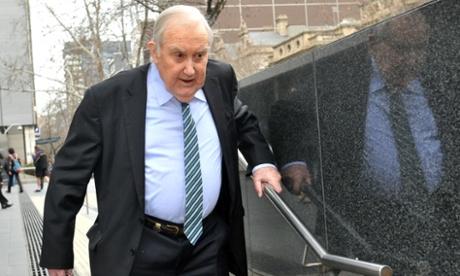The barrister appointed by Cardinal George Pell in 1996 to investigate hundreds of child sexual abuse claims involving the Catholic church in Melbourne thought all claims would be investigated within six months, the royal commission has heard.
More than 18 years later, Peter O’Callaghan QC is still working on the investigation as victims continue to come forward.
His role in Melbourne Response – the operation set up by the church to investigate the claims – included interviewing victims in his legal chambers in the city and making recommendations to the church as to whether they should be compensated, the royal commission into institutional responses to child sexual abuse heard on Tuesday.
On Monday, two witnesses told the hearing at Victoria county court in Melbourne how they felt discouraged by O’Callaghan from reporting their abuse to the authorities. They also spoke of feeling overwhelmed by O’Callaghan’s chambers, where most interviews were, and still are, carried out.
Abuse victim Paul Hersbach told the court on Monday that the chambers were “monstrous”.
“It was a massive room – monstrous – it seemed to me to be the domain of an experienced legal professional,” he said.
“Mr O’Callaghan looked very comfortable, but I was not. I attended this meeting alone.”
Head of the commission, Justice Peter McClellan, described how commissioners interviewing sex abuse victims tried to ensure interviews were carried out in a comfortable and supportive environment.
McClellan asked O’Callaghan: “Did you give consideration as to whether chambers was best place to meet with victims?”
O’Callaghan replied that interviews had initially been carried out at a separate office in Collins Street for 2-3 years but “it was becoming too cumbersome and it was more convenient to meet in my chambers”.
Responding to the discomfort of victims, O’Callaghan said: “Well I’ve heard that said and undoubtedly, some people were distressed,” O’Callaghan said. “But I feel that my secretary… generally she would meet with the victim and generally give a cup of tea and things of that nature.”
“In my chambers there’s naturally a desk, plenty of chairs and a large table,” he said. “If I felt my chambers were not amenable to providing assistance and comfort to people, I would have done something about it.”
Victims were not told they could bring a support person or lawyer to the meetings, but were permitted to do so if they asked, he added.
McClellan also asked if O’Callaghan had made an adverse finding against any priests who had not been prosecuted under criminal law.
“Yes,” O’Callaghan said.
“How many?” McClellan said.
“Not many,” O’Callaghan said, adding that he would have to come back to the court with the exact number.
O’Callaghan said that as an independent arbiter he had made decisions about sex abuse cases “without fear or favour and without any influence of other persons”.
He said it was not appropriate for him to say whether the compensation provided to victims by the church, currently capped at $75,000, was appropriate, despite McClellan pressing him to do so as someone who had been interviewing victims for more than 20 years.
The hearing continues.
